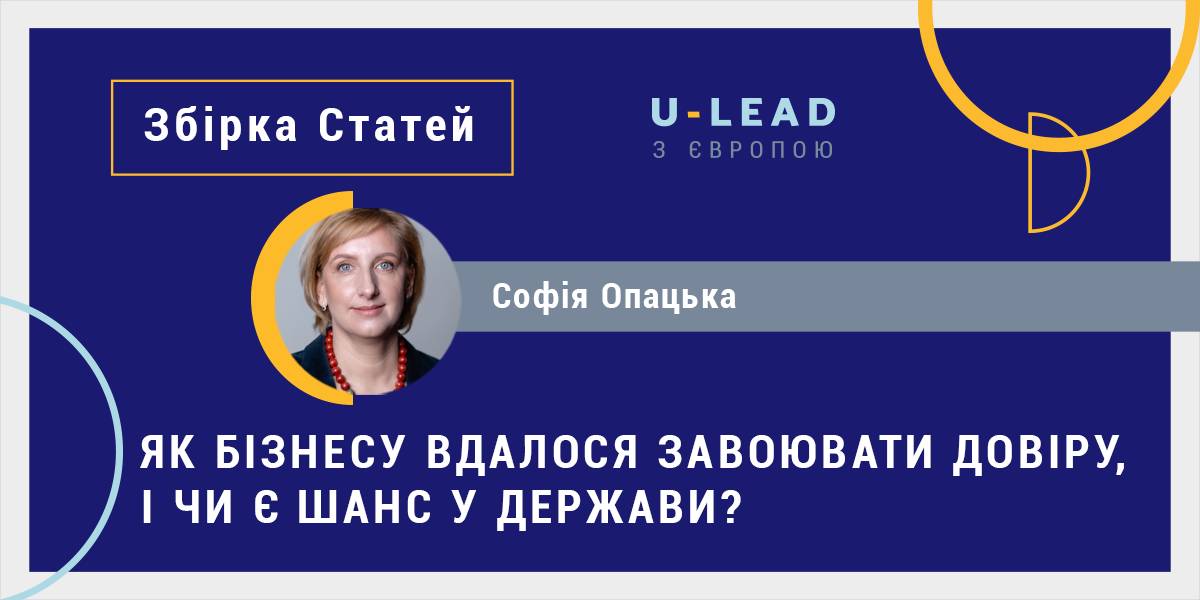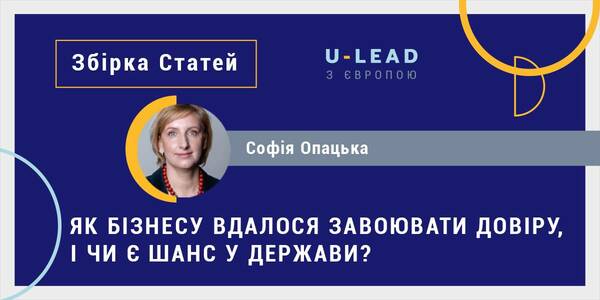How business gained trust of citizens and how the state can, too
Sofia Opatska is Vice Rector at Ukrainian Catholic University (UCU) and a Founding Dean of the Lviv Business School.
Trust in business
When the GfK Custom Research group carried out a survey of the values of Lviv residents in 2007, it revealed that most Lvivians had a very negative attitude towards wealthy, successful entrepreneurs. Fully 68% of respondents said that they thought commercial activities had a terrible impact on the environment and did not meet the interests of the community. Further, 59% said that businesses mercilessly exploited their employees, and 57% claimed that they had accumulated their capital largely through dishonest means. Doesn’t this sound just a little like the myth about the kurkuls and the soviet levelling process?
The study was initiated by members of the Univ Group[1], including Lviv businessman Yaroslav Rushchyshyn. When they saw the results, they understood that they had to immediately do something to change public opinion about entrepreneurship. After all, small and medium business underpins sustainable growth in pretty much all countries, while a strong middle class is the foundation for a civil society. This conclusion was confirmed during the Euromaidan and Revolution of Dignity, and once again when the COVID-19 epidemic hit the country.
The key step to change paradigms of thinking is education, but we need to remember that this is a long path. And so, in 2008, UCU’s Lviv Business School was established, one of whose key aims was to teach Ukrainian entrepreneurs to understand the global language of business and to communicate through it, as well as to help them enter world markets and present the new Ukrainian entrepreneur at home. Now in its 14th year, the community at Lviv Business School continuously debunks the myth about “dishonest exploiters.”
After a while, we saw how, when push came to shove, Ukraine’s business community began to take on certain government functions. We all remember how important a role the middle class played on the Maidan, during the Revolution of Dignity and when the war in eastern Ukraine began. It was entrepreneurs who then provided the Ukrainian army with many of its necessities. In 2020, we saw, once again, how invaluable the middle class is. Despite the very difficult situation at many companies, business threw its forces and resources to protect the medical professionals on the frontline of the battle against COVID-19, buying ventilators and essential medications. Once more, socially responsible business owners joined forces and helped the country at a critical turning point.
The post-Maidan epoch was significant for yet another phenomenon: business people, including successful owners and top managers, chose to work in the public sector in order to support systemic reforms in Ukraine. Those who weren’t prepared to leave their businesses helped financially and invested in education for the new generation of public administrators. It was precisely a group of Lviv entrepreneurs who founded the UCU Lviv Business School’s Good Governance programme after the Maidan. Many of the first graduates of this programme went on to work in government agencies and municipal governments, while three were elected to the Verkhovna Rada.
So, we can assume that trust in business has improved, not the least because of the role Ukrainian entrepreneurs have taken on themselves at those times that were critical for the country.
Trust in partnerships
The biggest indicator of trust or distrust in business is the quality of the partnerships that are established. Challenges in any partnership can firstly be overcome through quality corporate governance. Did the partners agreed to ground rules and begin to work on that basis or is everybody operating based on their own understanding of the conditions of the partnership?
One example of a successful partnership and good corporate governance is the Lviv Business School, which has several founders as well as Supervisory Board and Advisory Council. A particular feature of LvBS is that it was founded under the Ukrainian Catholic University, the only such institution in the post-soviet region. The founders spent a long time coming to an agreement originally, working things out with care and in great detail. The result was that in 13 years, we have never had any problems related to corporate governance. On one hand, everything is clearly regulated. On the other, everybody was in agreement from the very start, there is trust, and so there is no reason to revisit the regulations with any frequency. In short, if the statutes and partnership agreement have been properly put together, not just as a formality, the partnership can work.
Today, our partnership is evolving, especially in terms of cooperation among competing companies. For instance, Lviv’s IT cluster brings together companies that compete amongst themselves on the market for both labour and customers. They were able to agree about joining forces because there was a common understanding of the need to develop the market and that only together—in this case through an IT cluster—would it be possible to influence and change one of the key sectors of Ukraine’s economy today.
Trust in leadership
The 2008 world financial crisis demonstrated that leaders and top managers may have been competent but they lacked leadership qualities. They did not exhibit the necessary virtues, as if to say that business ethics were for weaklings. In fact, crises like the one in 2008 and the one today with the pandemic don’t help foster trust because people are afraid and tend to close ranks. And yet it’s precisely here that leaders play a key role in restoring trust.
Indeed, the 2008 crisis gave the impulse for a study by the Ivey Business School to develop a concept for “Leadership based on Character,” encompassing three main components: competence, character and dedication. The concept further defines the character of a leader as including 11 elements: drive, collaboration, humility, humanity, integrity, courage, temperance, accountability, transcendence, justice, and judgement.
The virtue of accountability is most strongly linked to trust. If a person remains unaccountable, most likely few will trust then. To be accountable means to be prepared to take responsibility for your decisions, actions or complicated issues and those of the institution you are part of, as soon as they arise. Together with responsibility, this means being prepared to admit a problem in public. Studies by the UCU Leadership Centre in Ukraine show that precisely accountability is the virtue that demands active development among business leaders and especially public administrators. It is the key to developing trust in leaders.
Trust in institutions
Historically, Ukrainians have been inclined to trust individuals rather than institutions. And so, we are constantly looking for some leader who will come and solve all our problems. Instead, we need to revive institutional trust, as it is the key to building democracy and tackling corruption, especially through personal action and personal responsibility.
It starts with our family, our building and our tenants’ association, with how we build relations in our team, our organization, our community and our country, the process of developing institutional trust. For instance, why not take an interest on how much you pay in taxes every month and where it all goes. This could be the first step to controlling your government, instead of just giving it credit and marking time until the next vicious election campaign.
Translated by Lidia Alexandra Wolanskyj
All terms in this article are meant to be used neutrally for men and women
Sofia Opatska has participated at the International Expert Exchange, "Development of Municipalities: trust, institutions, finance and people", organized by U-LEAD with Europe Programme in December 2020. His speech delivered during one of the workshops is to a great extent depicted in this article.
In the name of the U-LEAD with Europe Programme, we would like to express our great appreciation and thanks for both inputs of Ms. Opatska. The article will be included in future online publication Compendium of Articles.
Compendium of Articles is a collection of papers prepared by policymakers, Ukrainian and international experts, and academia after International Expert Exchange 2019 and 2020, organized by U-LEAD with Europe Programme. The articles raise questions in the fields of decentralisation reform and regional and local development, relevant for both the Ukrainian and the international audience. The Compendium will be published online in Ukrainian and English languages on the U-LEAD online recourses. Please, follow us on Facebook to stay informed about the project.
If you have any comments or questions about the Compendium of articles or this article in particular, please contact Yaryna Stepanyuk yaryna.stepanyuk@giz.de.
This publication has been produced with the assistance of the European Union and its member states Germany, Poland, Sweden, Denmark, Estonia and Slovenia. The contents of this publication are the sole responsibility of its authors and can in no way be taken to reflect the views of the U-LEAD with Europe Programme, the government of Ukraine, the European Union and its member states Germany, Poland, Sweden, Denmark, Estonia and Slovenia.
[1] Univ Group – an informal community of intellectuals united by the idea of creating a long-term strategy for Lviv.

22 November 2024
Уряд затвердив розподіл додаткової дотації для місцевих бюджетів на майже 800 млн грн
Уряд затвердив розподіл додаткової дотації для...
22 листопада, Уряд затвердив черговий розподіл додаткової дотації для місцевих бюджетів, повідомили у Міністертсві...
22 November 2024
Окремі питання обмеження доступу до публічної інформації в ОМС в умовах воєнного стану
Окремі питання обмеження доступу до публічної...
Програма USAID DOBRE підготувала відеороз’яснення на тему: «Окремі питання обмеження доступу до публічної інформації...
22 November 2024
Конкурс «Громада на всі 100»: став відомий список фіналістів
Конкурс «Громада на всі 100»: став відомий...
Завершився другий етап конкурсу «Громада на всі 100», під час якого серед 261 громади обрали 40 учасників, що...
22 November 2024
Division of competences between the state and...
18 листопада у Бучі відбувся круглий стіл щодо розподілу повноважень органів місцевого самоврядування та органів...
